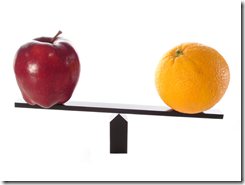Verbal sparring 101: Comparing apples and oranges makes a whole lot of sense. Don’t let anyone tell you otherwise.
/The next time someone attempts to counter your argument by claiming that you are making an “apples to oranges” comparison, say this:
Really? Apples and oranges are both similarly sized spherical fruits that grow on trees and weigh about the same. They have about the same number of calories per fruit. With the exception of vitamin E, they contain the same vitamins and minerals. They are two of the most cultivated and consumed fruits in the world. They can both be squeezed into a juice.
Is it really so ridiculous to be comparing two things that have so much in common?
Whoever decided to first use apples and oranges in this idiom wasn’t thinking straight.
Interestingly enough, it’s an idiom repeated around the world but using different objects. In France, the idiom compares apples to pears, which is even more ridiculous since apples and pears are even more alike than apples and oranges.
In Latin America, the comparison is potatoes to sweet potatoes. Also ridiculous.
Other cultures seem to understand the concept much better. The Serbians, for example, compare toads to grandmothers. The Romanians compare grandmothers to machine guns. And the Polish compare gingerbread to windmills.
The next time someone accuses me of making an apples to oranges comparison, I think I’ll say, “Did you mean a grandmothers to machine guns comparison, because apples and oranges have a hell of a lot in common.”
